Demetrius Poliorket. Triumph and defeat of the living god
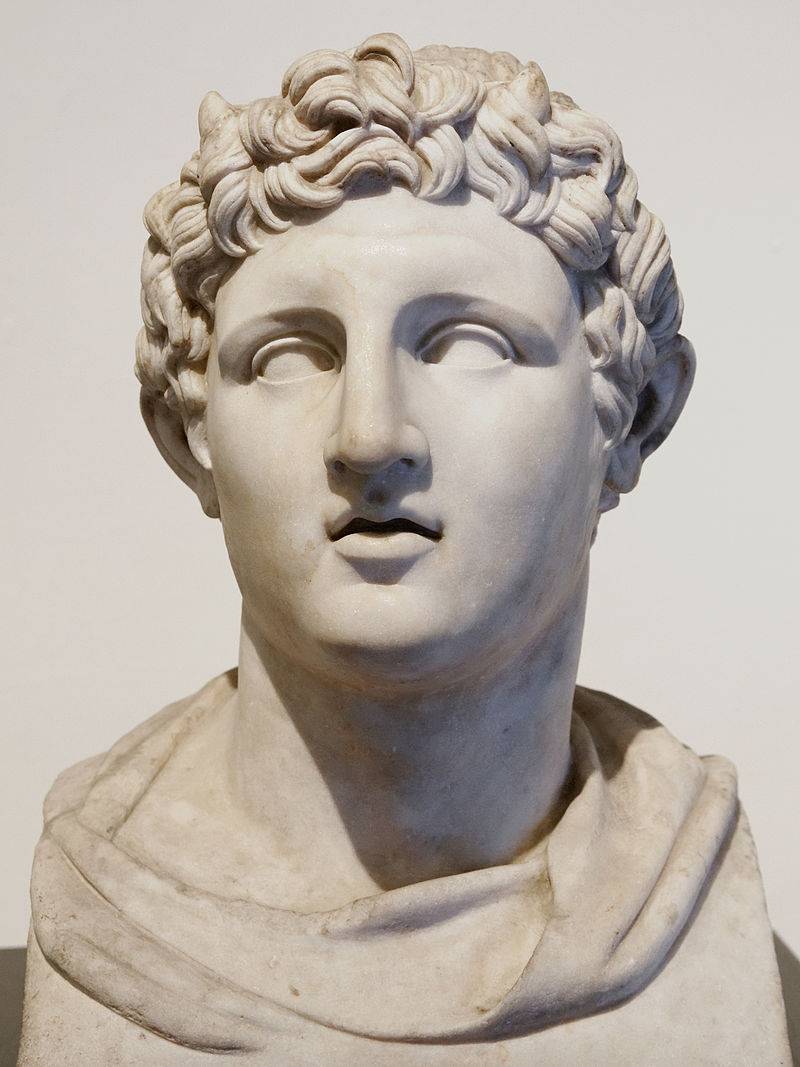
В previous article we talked about the origin and youth of Demetrius, the son of Antigonus One-Eyed, the beginning of his career as a commander, the first victories and defeats. Today we will continue this story.
living god
Until 307 B.C. e. Demetrius fought on the territory of Asia, but now he has transferred the fighting to the territory of Europe. At the head fleet out of 250 ships, he attacked Athens, where the garrison of Cassander, the son of Antipater, the ruler of Macedonia and an ally of the satrap of Egypt, Ptolemy, was located. Cassander hated Alexander the Great and his family, it was on his orders that the mother of the great conqueror Olympias, his wife Roxana and the only legitimate son Alexander were killed. He founded the city of Thessaloniki and ordered the rebuilding of Thebes.
The expedition of Demetrius was crowned with complete success, he managed to occupy Athens and the Piraeus harbors. Since Cassander was not popular with the Athenians, the inhabitants of the city welcomed Demetrius with joy, proclaiming him Soter (savior). Moreover, having settled him in the Parthenon, they began to worship him as the patron god of the city, calling him the son of Poseidon and Aphrodite. A certain Hermocles wrote a hymn in which there were such lines:
Hello, son of Cyprida!
Other gods are far away
And their prayers are in vain,
And they are not here, not one listens,
And You stand before us
Not stone, not wooden, but alive!
We pray to you:
O most merciful one, give us peace as soon as possible,
Almighty are you now!”
Demosthenes' nephew Democharos states:
Some of these things bothered Demetrius himself, however, everything else was extremely shameful and humiliating: the sanctuaries of Aphrodite Lamia and Leena, altars, libations, veneration as heroes of his flatterers Burikh, Adimant and Oxytenides. Even paeans were sung in honor of each of them, so that Demetrius himself was amazed at what was happening and said that not a single Athenian, great and strong in spirit, remained with him.
New phyla (territorial units) appeared in the Athenian policy - Antigonis and Demetrias. Previously, 50 representatives of each phylum formed the "Council of Five Hundred", but now it has become the "Council of Six Hundred". To the two previously existing "sacred" triremes of the Athenian fleet, two more were added, named after Antigonus and Demetrius.
Polemon in his work “On the Painted Portico in Sicyon” reports that the Thebans also built temples to his mistresses - Aphrodite Lamia and Aphrodite Leena.
You will probably not be surprised to learn that after the defeat of Demetrius, his veneration by the Athenians completely ceased.
In Athens, Demetrius married a second time, marrying Eurydice, who was descended from Miltiades. However, it was only a status marriage, Demetrius paid much more attention to the above-mentioned hetaera Lamia, which he took as a trophy after the victory at Salamis in Cyprus. Alluding to the nickname of Demetrius - "Besieger of the cities", Lamia was called the "Destroyer of cities."
On the way to royal title
After the capture of Athens, Demetrius received an order from his father to attack the island of Cyprus, which belonged to the ruler of Egypt, Ptolemy. On this island, the first of Demetrius' huge siege engines, Elepolis, was built. It was a 9-story tower, at different levels of which catapults and oxybels were placed.
In the spring of 306 BC. e. Demetrius at the city of Salamis (at that time the largest city in Cyprus, founded by people from this island) defeated the troops of Ptolemy's brother Menelaus, and then defeated the fleet of Ptolemy himself in a naval battle.
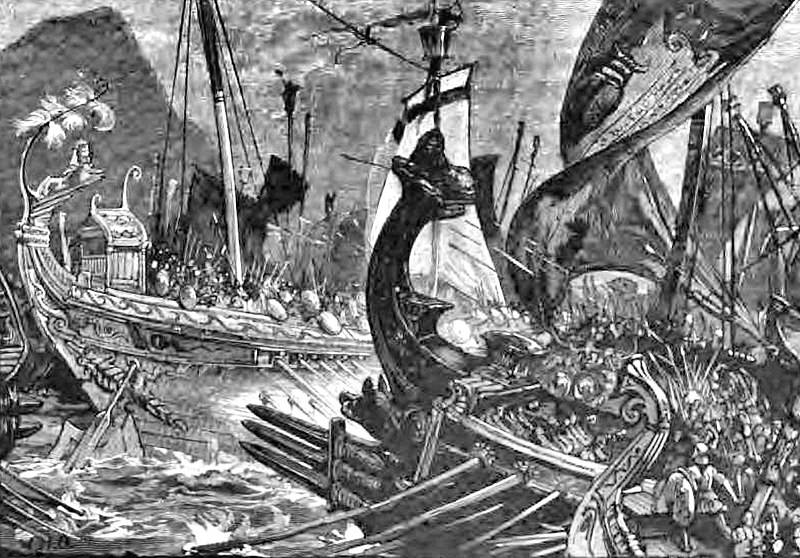
Battle between Ptolemy and Demetrius at Salamis, XNUMXth century engraving
During this battle, three bodyguards of Demetrius, who were next to him, were injured, one of them later died. Salamis capitulated, the island of Cyprus came under the rule of Demetrius. Among the prisoners were the already mentioned hetaera Lamia and the son of Ptolemy Leontisk (some argue that his mother was the famous hetaera Thais of Athens), whom Demetrius released without ransom.
After this victory, Antigonus and Demetrius proclaimed themselves kings. Other diadochi soon followed suit. It is believed that it was Demetrius who was the first in the ancient world to place his portraits on coins - until then, images of gods or dead heroes were applied to them. On the obverse of this drachma we see the image of Demetrius Poliorketes with bull horns, and on the reverse - Poseidon:
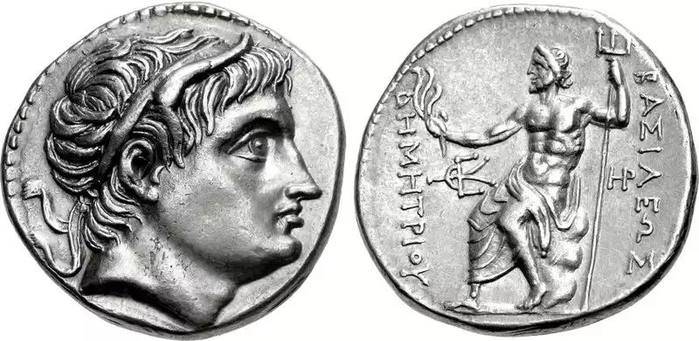
Poliorket
In the next 305, Demetrius decided to punish the inhabitants of the island of Rhodes, who refused to support his campaign against Cyprus. It was then that powerful siege machines that terrified everyone were built, and Demetrius received the nickname "Besieger of the City" - Poliorket. The length of one of the rams reached 55 meters, they say that it took at least a thousand people to control it. The imagination of contemporaries was also struck by the wheeled siege tower "Gelepolis" ("Conqueror of Cities"), the height of which, according to various sources, was from 30 to 40 meters, width - 18 meters, base - about 20 meters.
This is how the siege of Rhodes by the army of Demetrius looks like on one of the engravings:
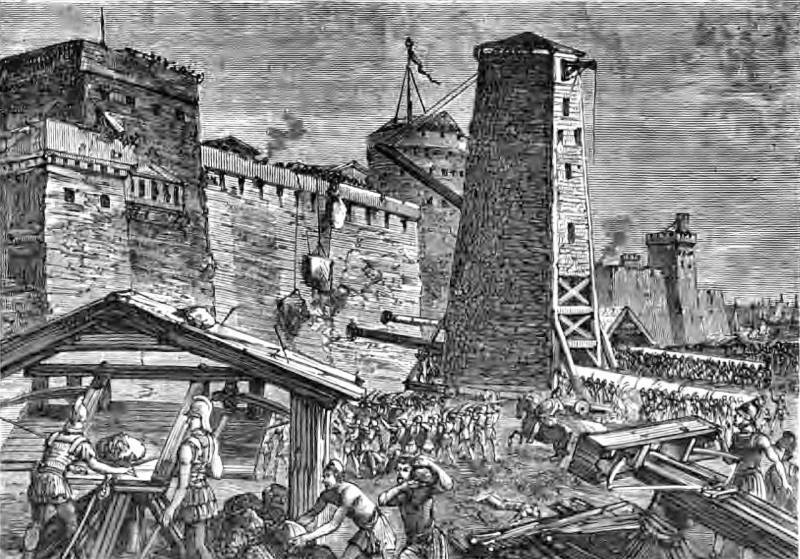
And this is a model of the Helepolis siege tower, the image of which you saw in the previous illustration (Thessaloniki Technology Museum):
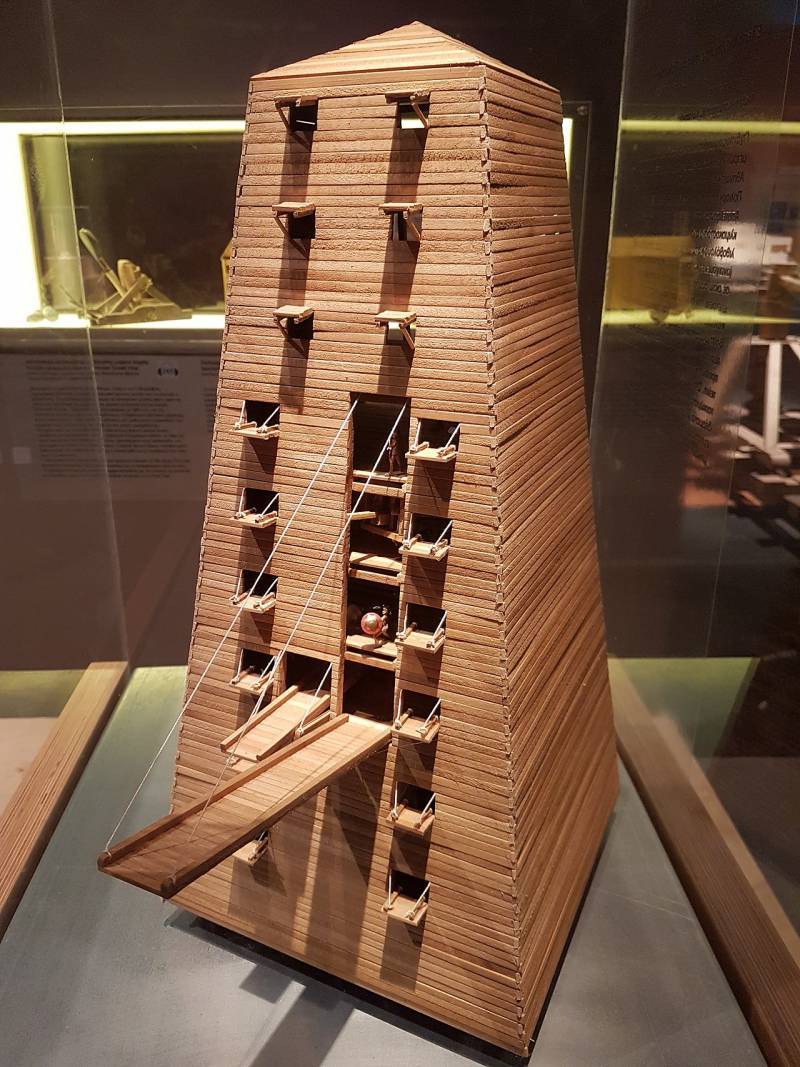
In 304 BC. e. an agreement was concluded according to which Rhodes, while maintaining autonomy, became an ally of Antigonus and Demetrius and gave them hostages. Huge siege engines Demetrius left on the island, their bronze parts were used to build the Colossus of Rhodes.
"City Destroyer"
In the same 304 BC. e. Demetrius returned to Greece, having driven back Cassander's troops besieging the city from Athens. In the spring of 303 BC. e. he sent his troops to the Peloponnese, capturing Argos, Corinth, Orchomenus and Sicyon, which was briefly renamed Demetrias.
At the initiative of Demetrius in 302 BC. e. The Corinthian Union was re-established. But in Athens, dissatisfaction with the behavior of Demetrius was growing. The Athenians now had a special dislike for the hetera Lamia.
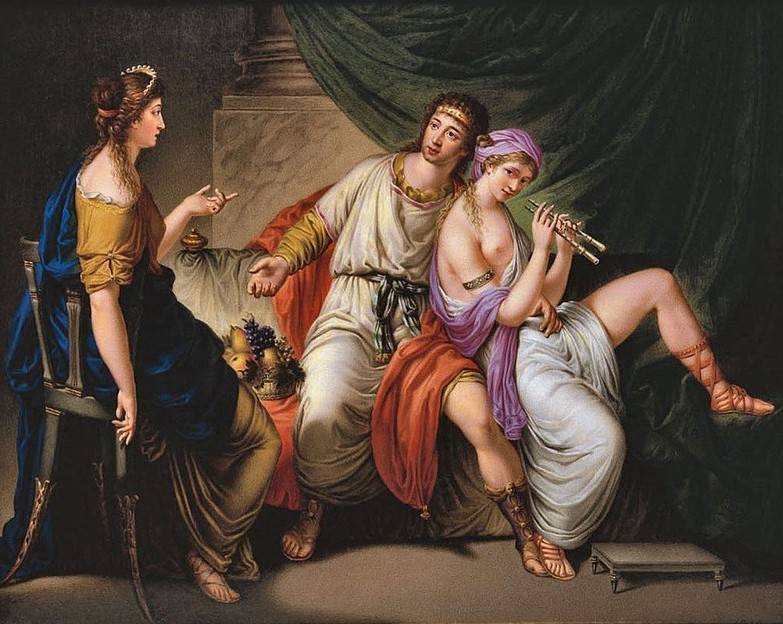
F. Kavcic, "Demetrius, Lamia and her friend Dema"
Plutarch writes about this woman:
He:
Let's continue to quote Plutarch:
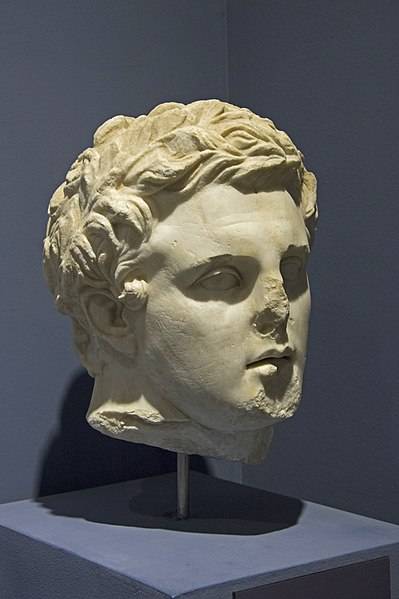
Bust of Lysimakh, Museum of Seljuk Culture, Kayseri, Turkey
From Demetrius, Lamia gave birth to a daughter, Phila. But from 302 BC. e. the name of this hetaera disappears from historical documents, she may have died during childbirth.
Some also speak of the interest that Demetrius showed in handsome young men, one of whom, Democles the Handsome, died after jumping into a cauldron of boiling water in a bath to escape his harassment. For some time, Democles was revered by the Athenians as a symbol of the honor and love of freedom of this policy.
Disaster at Ipsus

The possessions of the Diadochi before the battle of Ipsus (about 303 BC).
The rise of Antigonus and Demetrius caused serious concern to the other Diadochi. Soon a new war began, in which Seleucus, Lysimachus and Cassander became their opponents. The decisive battle took place in the summer of 301 BC. e. in Phrygia near Ipsus.
The forces of the parties were approximately equal, but the opponents of Antigonus had an advantage in the number of elephants: 480 versus 75. During the battle, Demetrius' cavalry units overturned the riders of Seleucus' son Antiochus, but were too carried away by their pursuit. Demetrius returned to the battlefield too late: his father was defeated and died in battle.
With ten thousand soldiers, he retreated to Ephesus, and the victors divided the lands of Antigonus among themselves. Now on the territory of the former empire of Alexander the Great there were four kingdoms: Ptolemy with the center in Egypt, Lysimachus in Greece and Asia Minor, the huge Asian power Seleucus and Macedonia, where Cassander ruled.
The Athenians refused to obey Demetrius, but returned the ships placed in the harbor, the treasury and allowed his third wife Deidamia (sister Pyrrha) to leave the city. Many other policies followed the example of Athens. Demetrius retained his power in Cyprus, the Aegean Islands, Corinth, Megara and several cities on the western coast of Asia Minor and in the area of the Black Sea straits. However, the alliance of his opponents fell apart: now Ptolemy and Lysimachus united against Seleucus.
Demetri continued to fight. In 300 (according to other sources - in 299) BC. e. he struck at the possessions of Lysimachus in Thrace. He concluded a truce with Seleucus, who married the daughter of Demetrius Stratonikos, but was later forced to give in to her son, who was in love with this woman. But Demetrius also captured Cilicia, which led to an aggravation of relations with Seleucus, who claimed these lands.
In 294 BC. e. Demetrius again subjugated Athens, but ceded Cyprus to Ptolemy. And then he was called for help by the son of the deceased in 297 BC. e. Cassandra Alexander, who could not divide Macedonia with his brother Antipater. Demetrius was late: the king of Epirus Pyrrhus and Lysimachus had already managed to help the brothers come to a peace agreement.
Demetrius, who appeared, was invited by Alexander to a “consolation” feast, at which this diadoch stabbed the owner. Pyrrhus, whose sister Deidamia was married to Demetrius (his third wife), advised the Macedonians not to worry about trifles: Demetrius is a Macedonian from a respected family, an experienced politician and a good commander, what else do you need? Live and be happy. Alexander's brother Antipater chose not to mess with Demetrius and fled the country, the Macedonians proclaimed Poliorket king, and he ruled here for 7 years.
Now the power of Demetrius included Macedonia, part of Greece and Asia Minor, and some islands. But Boeotia rebelled. The rebellion was suppressed, but during the siege of Thebes, Demetrius was wounded by an arrow in the neck.
In 288 BC. e. Ptolemy, Lysimachus and Pyrrhus started a war against Demetrius. He still managed to defeat Lysimachus at Amphiopolis, but this was the last success. Upon learning of her husband's defeat, his first wife Phila, daughter of Antipater and mother of the heir to the throne, committed suicide. Demetrius retreated first to Greece, then to Asia Minor. Here, in Miletus, the 50-year-old Demetrius married for the fifth time - to Ptolemaida, the daughter of Ptolemy, with whom he became engaged 13 years ago. He held on for some time, until the son of Lysimachus Agathocles pushed him to the east, cutting him off from the last possessions.
Pursued by Agathocles, Demetrius crossed the Taurus Mountains, ending up in the state of Seleucus. After a few months, he was forced to surrender to him. As we remember from previous article, the son of Demetrius Antigonus offered for his freedom all the property and himself in addition. However, Seleucus did not risk releasing such a serious and dangerous enemy. Demetrius, the father of the former wife of Seleucus, who became the wife of his heir Antiochus, ended his life as an honorary prisoner in the city of Apomea.
It is reported that at first he hunted a lot and did military exercises, but then, finally realizing that he would never return his freedom, he fell into depression and apathy. He died in 283 BC. e., the cause of his death Plutarch calls gluttony and drunkenness.
The ashes of Demetrius in a golden urn were sent to Greece and handed over to his son and heir Antigonus II Gonat (that is, from the city of Gonna). He buried the remains of his father in the city of Demetrias he founded - near Iolk. After 7 years, in 276 BC. e., Antigonus II, having hired about 9 thousand Celts and agreed on an alliance with Aetolia, conquered Macedonia. His descendants remained on the Macedonian throne until 168 BC. e., when the last king of the Antigonid dynasty, Perseus, was defeated in the war against Rome.
Information